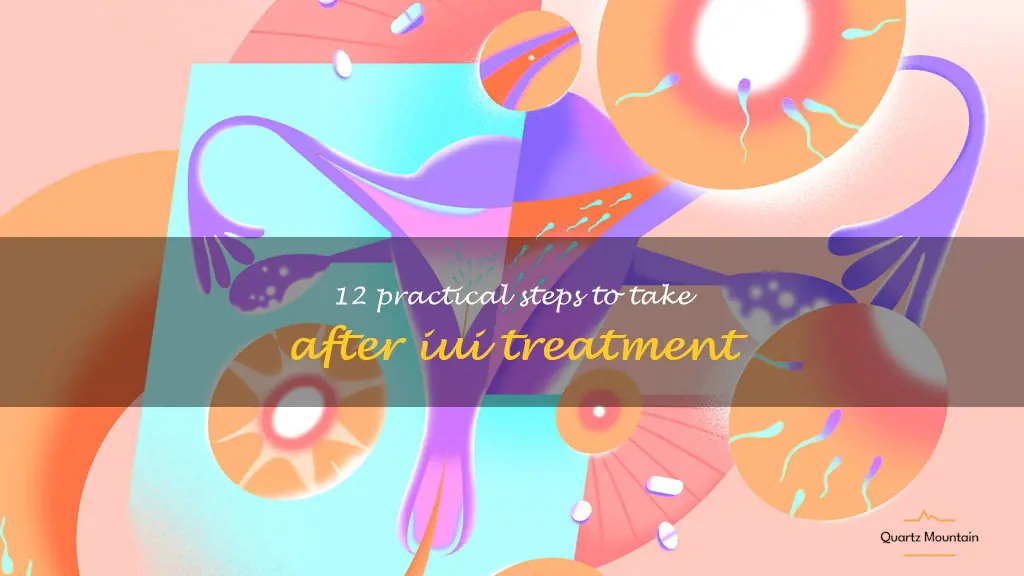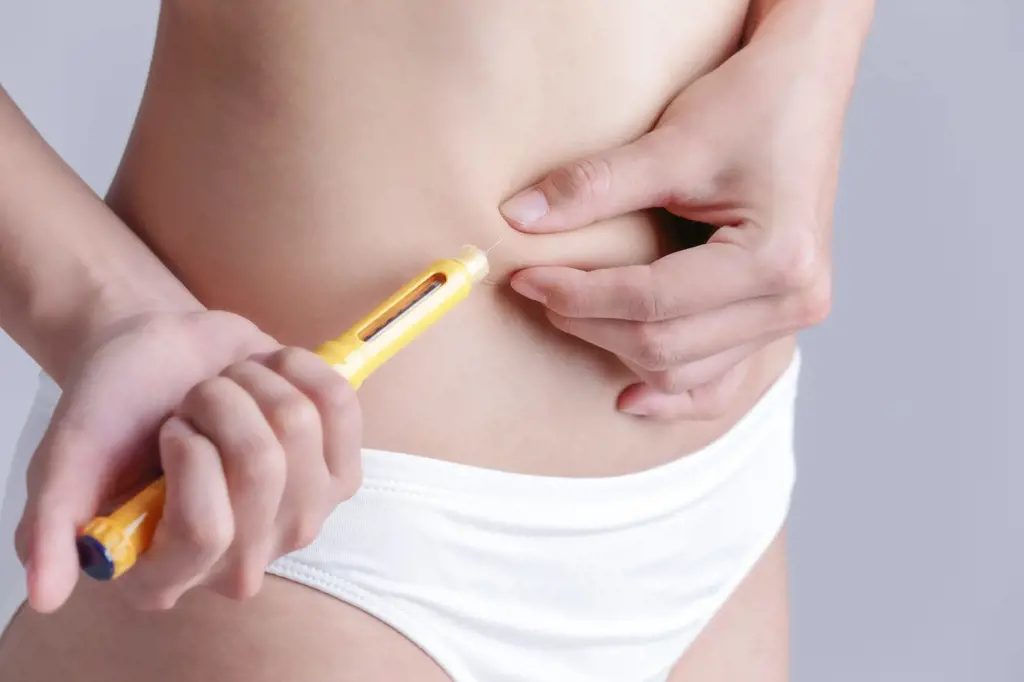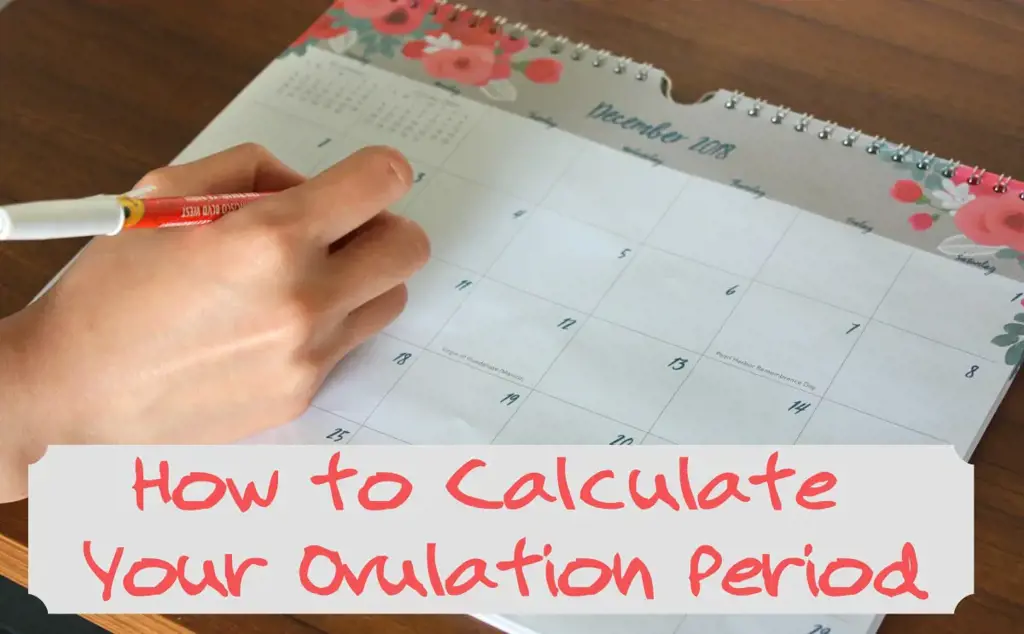
After undergoing intrauterine insemination (IUI) treatment, it is natural to feel a sense of anticipation and eagerness to know if the treatment was successful or not. While it can be a nerve-wracking experience, taking proactive steps can help to improve your chances of a successful and healthy pregnancy. In this article, we will explore 12 practical and effective steps that you can take after IUI treatment to ensure that you give yourself the best chance to conceive and bring a healthy bundle of joy into the world.
What You'll Learn
- Rest and relax for at least 24 hours
- Avoid sexual activity for at least 2-3 days
- Stay hydrated and eat a healthy diet
- Avoid strenuous exercise and heavy lifting for a few days
- Take prescribed medications as instructed
- Attend follow-up appointments with your doctor
- Monitor your body temperature and report any symptoms to your doctor
- Keep track of your menstrual cycle
- Avoid smoking, alcohol, and caffeine
- Practice stress management techniques such as meditation or yoga
- Talk to your partner and support system about your feelings and concerns
- Be patient and remain positive

Rest and relax for at least 24 hours

Congratulations on successfully completing your IUI treatment! After the procedure, your body needs some time to recover and prepare for the implantation of the fertilized egg. Rest and relaxation are important for optimal results. Here are some things you should do after IUI to help improve your chances of success.
It is important to rest and relax for at least 24 hours after the IUI procedure. This will allow your body to recover from the procedure and have a higher chance of implantation success. Experts recommend avoiding strenuous activities during this time, such as exercising, lifting weights, or having sexual intercourse.
Avoid Stressful Activities:
In addition to avoiding strenuous activities, it is important to avoid anything that could cause you stress or anxiety. Stress can have an adverse effect on your ability to conceive, and it can also affect the body's ability to heal and recover after the procedure. Take this opportunity to pamper yourself and treat yourself to some well-deserved rest and relaxation.
Stay Hydrated:
Drinking plenty of water is vital after IUI. Drinking water helps flush out toxins from the body and can help prevent any side effects that may occur from the procedure. Avoid drinking coffee, tea, alcohol, or other beverages that can cause dehydration. Instead, focus on drinking plenty of water and electrolyte-rich fluids such as coconut water or low-sugar sports drinks.
Take Your Prescribed Medications:
Your doctor may have prescribed medications to help improve your chances of a successful pregnancy. It is important to take these medications as instructed, and not to skip or miss a dosage. Some women may experience side effects from the medication, and speaking to your doctor can help alleviate any concerns or discomfort you may be experiencing.
Follow Your Doctor's Instructions:
Lastly, remember to follow your doctor's instructions regarding post-IUI care. Your doctor will give you specific instructions based on your individual case, and it is important to follow these instructions as closely as possible. If you have any questions or concerns, do not hesitate to ask your doctor.
Remember, after IUI, rest and relaxation are vital in helping increase your chance of conception success. Remember to take care of yourself, avoid anything that could cause you stress, and follow your doctor's instructions closely, and you will be on your way to a happy and healthy pregnancy.
12 Fun Family Things to Do in Tulsa This Weekend
You may want to see also

Avoid sexual activity for at least 2-3 days

After undergoing an intrauterine insemination (IUI) procedure, it's important to take care of your body and avoid certain activities to improve your chances of success. One of the things you should avoid is engaging in sexual activity for at least 2-3 days after the procedure.
The reason behind this advice is to give the sperm time to settle in the uterus and increase the chances of fertilization. Engaging in sexual activity immediately after IUI can disturb the delicate balance created by the procedure, making it less likely for the sperm to reach the egg.
In addition to avoiding sexual activity, there are other things you can do after IUI to increase your chances of success. Here are some tips to help you during the two-week wait:
- Keep yourself relaxed: Stress can have an adverse effect on your fertility, so it's important to stay calm and relaxed after IUI. Make time for activities that help you unwind, such as meditation, yoga, or a relaxing bubble bath.
- Stay hydrated: Drinking plenty of fluids is important after IUI as it helps to flush out any toxins in your body and keeps your body hydrated. Aim to drink at least eight glasses of water a day to stay hydrated.
- Avoid heavy lifting: You should avoid lifting any heavy objects after IUI. This is because heavy lifting can put pressure on your abdominal muscles, which can cause cramping and discomfort.
- Take your medication: If your doctor has prescribed any medication after IUI, it's important to take it as prescribed. This will help to regulate your hormones and improve your chances of success.
- Eat a healthy diet: A healthy and balanced diet plays a significant role in fertility. Eat a diet that is rich in fruits, vegetables, and whole grains. Avoid processed foods and sugary snacks.
Following these tips can help to increase your chances of success after IUI. Remember, it's important to take care of yourself both physically and mentally during the two-week wait. And most of all, stay positive and hopeful for the best outcome!
11 Fun and Exciting Things to Do in Nanuet, NY
You may want to see also

Stay hydrated and eat a healthy diet

If you've recently undergone intrauterine insemination (IUI), congratulations! You're one step closer to potentially achieving pregnancy. Now, it's important to take extra care of yourself and focus on self-care in the days and weeks following your IUI procedure. One crucial component is staying hydrated and maintaining a healthy, nutritious diet. In this article, we'll explore why this is important and offer tips for how to stay on track.
Staying hydrated is important for a variety of reasons, but when it comes to fertility and conception, it's particularly crucial. Proper hydration helps support the production of cervical mucus, which plays a key role in sperm survival and transport. Additionally, drinking plenty of water can help prevent dehydration, which can negatively impact sperm and egg quality.
To stay hydrated after your IUI, it's essential to drink plenty of water throughout the day. Aim for at least 8-10 cups of water each day, but listen to your body—if you're thirsty or sweating, you may need to drink more to stay properly hydrated. You can also supplement your water intake with other hydrating beverages, such as herbal tea, coconut water, or low-sugar sports drinks.
For many people, taking care of their bodies and eating a healthy diet go hand-in-hand. But when it comes to fertility and conception, following a nutritious diet can be especially important. Eating a healthy selection of fruits, vegetables, lean proteins, and whole grains can help improve overall health and boost fertility. It can also help regulate blood sugar and hormone levels, which can be particularly important in the two-week wait after an IUI.
To maintain a healthy diet after an IUI, it's important to focus on whole, nutrient-dense foods. Aim to eat plenty of fresh fruits and vegetables, whole grains and lean proteins to keep your body fueled and nourished. You may also want to avoid or limit highly processed foods, added sugars, and heavy alcohol or caffeine consumption, as these can negatively impact fertility. And don't forget to eat regularly, as skipping meals can lead to dips in blood sugar and energy levels.
While staying hydrated and eating a healthy diet may seem like basic steps, they can play an important role in supporting fertility and conception after an IUI. By focusing on these habits, you can take an active role in your health and well-being, potentially leading to better chances of pregnancy. So drink up and eat well—your body (and future baby!) will thank you.
12 Fun Ideas for Hanging Out with Friends in Bakersfield
You may want to see also

Avoid strenuous exercise and heavy lifting for a few days

After undergoing intrauterine insemination (IUI), there are many things you can do to increase your chances of conception. One thing to keep in mind is that IUI is not a guarantee that you will get pregnant, but there are things you can do to help increase the chances.
The first thing to do after IUI is to avoid strenuous exercise and heavy lifting for a few days. You need to avoid any form of exercise or physical activity that can put stress on your body. Rest and relaxation are crucial after this procedure as you allow your body to take a break and recover from the process.
Strenuous exercise and heavy lifting can cause cramps that can dislodge the sperm from the cervix. This can drastically reduce your chances of getting pregnant. It is important to take things slow and avoid any activity that can cause discomfort in your pelvic area.
It is also recommended that you avoid sexual intercourse for 2-3 days after the procedure. This is to allow the sperm to have time to attach to the eggs and fertilize them. If you feel any pain or discomfort during this time, it is best to contact your doctor immediately.
Other things to do after IUI include avoiding hot tubs, saunas, and any other form of heat therapy. This is to prevent heat from damaging the sperm, which can decrease their quality. You should also avoid alcohol, smoking, and caffeine as these can reduce fertility levels.
It is important to stay relaxed and calm after IUI, so try to stay busy with activities that you enjoy doing. Relaxation techniques like meditation, yoga, and breathing exercises can help reduce stress, which can improve your chances of getting pregnant.
In summary, IUI is a delicate procedure that requires patience and proper aftercare. Avoid strenuous exercise and heavy lifting for a few days after the procedure, and avoid any form of heat therapy. Stay calm, avoid alcohol, smoking, and caffeine, and practice relaxation techniques to increase your chances of conceiving. If you experience any discomfort or pain, consult your doctor immediately.
14 Fun Things to Do in St. George Island
You may want to see also

Take prescribed medications as instructed

After undergoing intrauterine insemination (IUI), it's important to take the prescribed medications as instructed. These medications may include progesterone supplements, which help support the uterine lining and maintain a healthy pregnancy, or fertility drugs like Clomid or Letrozole, which stimulate ovulation and increase the chances of a successful pregnancy. It's important to follow your doctor's instructions carefully to optimize your chances of pregnancy.
One of the most common medications prescribed after IUI is progesterone, which is usually administered as a vaginal suppository or injection. This medication is used to support the implantation of the fertilized egg in the uterus and prevent miscarriage. Progesterone is typically started one to two days after the IUI procedure and continued until the pregnancy test is performed two weeks later. It's important to take this medication as directed, usually once per day or as otherwise instructed by your doctor.
Another medication that may be prescribed after IUI is Clomid or Letrozole, which are fertility drugs that stimulate ovulation. These medications are usually taken for five days starting on day three or four of your menstrual cycle. They work by increasing the levels of follicle-stimulating hormone (FSH) in the body, which encourages the ovaries to produce more mature eggs. These eggs are then released during ovulation, which typically occurs about 36 hours after the HCG injection is given. It's important to take these medications as directed and follow up with your doctor for monitoring throughout your cycle to optimize your chances of pregnancy.
Other things you can do after IUI to optimize your chances of pregnancy include keeping track of your ovulation, avoiding alcohol and smoking, eating a healthy diet, and getting enough rest and exercise. It's important to follow up with your doctor regularly to monitor your progress and make any necessary adjustments to your treatment plan. With the right care and attention, you can increase your chances of achieving a successful pregnancy after IUI.
12 Fun Things to Do in Conneaut, Ohio
You may want to see also

Attend follow-up appointments with your doctor

After going through an intrauterine insemination (IUI) procedure, it is essential to attend follow-up appointments with your doctor. These appointments are necessary to monitor the success of the procedure as well as guide you through the next steps.
Here are some of the things you should expect during your follow-up appointments:
- Confirming pregnancy: Your doctor will schedule a pregnancy test two weeks after your IUI procedure to determine if it was successful. If the test comes back negative, they may advise you to try the procedure again the next month.
- Ultrasound: If the pregnancy test is positive, your doctor will schedule an ultrasound to confirm the pregnancy's location and check if it's developing correctly.
- Blood tests: Your doctor may order frequent blood tests to track the pregnancy's progress and ensure you don't have any underlying health issues that could harm the baby.
- Medications: Your doctor may also prescribe medications to support the pregnancy, such as progesterone supplements or anticoagulants.
- Diet and lifestyle changes: Your doctor may advise you to make changes to your diet and activities to ensure a healthy pregnancy. They may also guide you on taking supplements and avoiding harmful substances like alcohol, cigarettes, and certain foods.
Overall, attending your follow-up appointments is vital to your health and the success of the pregnancy. It will help you keep track of your pregnancy, monitor your wellness, and receive prompt medical care if any complications arise.
In conclusion, after an IUI procedure, it is essential to attend follow-up appointments with your doctor. These appointments will guide you through the next steps and ensure that your pregnancy is progressing correctly. By following your doctor's advice, you can increase your chances of achieving a successful pregnancy.
13 Unique Things to Do in Bellingham That Will Leave You Wanting More
You may want to see also

Monitor your body temperature and report any symptoms to your doctor

After an intrauterine insemination (IUI) procedure, it is important to monitor your body temperature and report any symptoms to your doctor. This can help you to identify any potential issues early on and take appropriate action to address them.
IUI is a fertility treatment that involves injecting sperm into a woman’s uterus using a small catheter. This is typically done around the time of ovulation to increase the chances of fertilization and pregnancy.
Things to do after IUI
Once the IUI procedure is over, there are several things you can do to improve your chances of success. Here are some tips:
- Rest: It is important to rest for a few hours after the procedure. This can help to reduce any discomfort and improve the chances of success.
- Avoid strenuous exercise: Avoid any strenuous exercise or heavy lifting for at least 24 hours after the procedure.
- Monitor your temperature: Monitoring your body temperature can help you to identify any potential issues. Take your temperature every morning before getting out of bed and record it in a chart. If your temperature remains elevated for more than two weeks, this could be a sign of pregnancy. On the other hand, if your temperature drops after a few days, this could indicate that the procedure was unsuccessful.
- Report any symptoms: If you experience any unusual symptoms after the procedure, such as severe pain, fever, or heavy bleeding, report them to your doctor immediately. These could be signs of an infection or other complication.
- Follow your doctor’s instructions: Your doctor will provide specific instructions on when to take any medications, when to return for a follow-up appointment, and when to have intercourse. Follow these instructions carefully to maximize your chances of success.
Monitoring your body temperature and reporting any symptoms to your doctor are important steps to take after an IUI procedure. By following these guidelines, you can improve your chances of success and ensure that any potential issues are addressed early on. Remember to take care of yourself and stay positive during this exciting time.
11 Fun Things to Do in Grayling, MI
You may want to see also

Keep track of your menstrual cycle

After undergoing an intrauterine insemination (IUI) procedure, it is important to take certain steps to ensure optimal results. While the success rates of IUI can vary, there are a number of things you can do to increase your chances of conceiving. One of the most important things you should do is keep track of your menstrual cycle. In this article, we will explore why this is so important and how to go about doing it effectively.
The menstrual cycle is the process by which the female body prepares an egg for fertilization. It lasts for an average of 28 days and is divided into four phases. The first phase is the menstruation phase, where the uterus sheds the lining that was prepared during the previous cycle. The second phase is the follicular phase, where the body begins to prepare a new egg for release. The third phase is the ovulation phase, where the egg is released from the ovary and travels towards the uterus. Finally, the luteal phase is where the uterus prepares for implantation in case the egg is fertilized.
Keeping track of these phases can be incredibly useful for couples who are trying to conceive. This is especially true for those who have undergone IUI, as timing is crucial when it comes to achieving a successful pregnancy. To begin tracking your menstrual cycle, it is important to understand the length of your cycle. This can vary from woman to woman, but on average, most cycles last between 24 and 34 days.
Once you have an idea of your average cycle length, you can begin tracking the phases of your menstrual cycle. This can be done through a number of methods, including keeping a menstrual calendar or using a fertility tracking app. These tools can help you determine when you are most likely to be ovulating, which is the ideal time to have sex or undergo IUI.
In addition to tracking your cycle, it is important to take other steps to optimize your chances of conceiving after IUI. This includes maintaining a healthy lifestyle, including a balanced diet and regular exercise, reducing stress, avoiding alcohol and tobacco, and taking any prescribed fertility medications.
In conclusion, keeping track of your menstrual cycle is an essential step to take after undergoing IUI. By understanding the phases of your cycle, you can better time intercourse or IUI to increase your chances of conceiving. Additionally, maintaining a healthy lifestyle and taking prescribed medications can also increase your odds of success. By taking these steps, you can maximize your chances of achieving a successful pregnancy and finally becoming a parent.
13 Festive Activities to Experience in Houston this Christmas
You may want to see also

Avoid smoking, alcohol, and caffeine

After undergoing an intrauterine insemination (IUI) procedure, it is important to follow certain guidelines to optimize the chances of a successful pregnancy. One of the most significant aspects to consider is the lifestyle choices you make. In particular, it is crucial to avoid smoking, alcohol, and caffeine.
Smoking can affect both male and female fertility significantly. It is known to reduce the quality and quantity of sperm in men and can also contribute to ovulatory dysfunction in women. In addition, smoking during pregnancy can lead to miscarriage, premature birth, low birth weight, and infant mortality. Therefore, it is recommended to quit smoking at least three months before the IUI procedure and avoid smoking throughout the pregnancy and beyond.
Similarly, alcohol consumption has a detrimental effect on fertility and pregnancy. Research indicates that drinking alcohol can lower sperm count and motility in men and disrupt the menstrual cycle in women, leading to ovulatory disorders. Drinking during pregnancy can cause a range of birth defects, including fetal alcohol syndrome. Thus, it is advisable to avoid alcohol at least three months before the IUI procedure and throughout the pregnancy.
Caffeine is also known to affect fertility, especially in women. It can reduce the chances of conception, cause miscarriage, and low birth weight in infants. Experts suggest that limiting caffeine intake to 200 milligrams (mg) per day or less is safe. This amount is roughly equivalent to a single cup of coffee or two cups of tea.
Apart from avoiding smoking, alcohol, and caffeine, there are several other things that you can do after an IUI procedure to improve the chances of success. These include:
- Resting for a day or two after the procedure
- Taking prescribed medications as directed
- Eating a healthy and balanced diet
- Practicing stress-reducing techniques like yoga, meditation, or deep breathing
- Light to moderate physical activity, such as walking, swimming, or cycling
In conclusion, it is essential to make healthy lifestyle choices after undergoing an IUI procedure. Avoiding smoking, alcohol, and caffeine are crucial steps that you can take to optimize the chances of a successful pregnancy. By adhering to these guidelines, you can increase the likelihood that you will have a healthy baby.
12 Fun Activities to Explore in Hopewell NJ
You may want to see also

Practice stress management techniques such as meditation or yoga

Intrauterine insemination, commonly referred to as IUI, is a fertility treatment that involves placing sperm directly into the uterus during ovulation. After undergoing an IUI, it is essential to take good care of yourself and make efforts to manage your stress levels.
Stress can have a significant impact on your fertility and overall health. Stress activates the sympathetic nervous system, which signals the body to release cortisol and adrenaline, hormones associated with the "fight or flight" response. When these hormones are consistently elevated, it can interfere with ovulation and reduce the chances of successful conception.
Therefore, practicing stress management techniques such as meditation or yoga can be highly beneficial in the post-IUI period. Here are some ways in which you can incorporate stress management techniques into your routine:
- Meditation: Meditation is a powerful tool to manage stress and anxiety. It involves sitting comfortably, focusing on your breath, and observing your thoughts without judgment. Research has shown that regular meditation can reduce stress, lower blood pressure, and increase feelings of well-being.
- Gentle exercise: Yoga, Pilates, and Tai Chi are all examples of gentle exercise that can help reduce stress. These activities are low impact and focus on breathing and stretching, bringing balance and relaxation to the body.
- Practice mindfulness: Mindfulness involves paying attention to the present moment intentionally, without judgment. Taking a walk in nature, spending time with loved ones, or engaging in a creative activity such as cooking or painting can help you stay present and reduce stress.
- Deep breathing: When we are stressed, our breathing becomes shallow and rapid. Practicing deep breathing exercises can help slow down your breathing and calm your mind. One technique is to inhale deeply through your nose for a count of four, hold your breath for a count of four, and then exhale slowly through your mouth for a count of six.
In conclusion, managing stress after an IUI can greatly increase your chances of successful conception. Incorporating stress management techniques such as meditation, gentle exercise, mindfulness, and deep breathing into your routine can help reduce stress and create a calm and peaceful environment for your body to conceive. Remember to be patient, take care of yourself, and believe in the process.
12 Fun and Affordable Things to Do in Punta Cana with Your Family
You may want to see also

Talk to your partner and support system about your feelings and concerns

Undergoing intrauterine insemination (IUI) can be an overwhelming experience, both physically and emotionally. One of the best things you can do after IUI is to talk to your partner and support system about your thoughts, feelings, and concerns.
Here are some things to keep in mind when having these important conversations:
- Be honest: It’s important to be truthful about how you’re feeling, both positive and negative. If you’re feeling scared, excited, anxious, sad, or anything in between, share these emotions with your partner and support system.
- Talk about expectations: IUI can be a process which brings up a lot of expectations. From wanting a positive pregnancy result to dealing with the side effects of fertility drugs, it’s important to have an open and honest conversation with your partner about what your expectations are before and after the procedure.
- Remember that you’re in this together: You and your partner are both part of the IUI journey. Support each other and lean on each other when you need it.
- Consider getting professional support: Sometimes it may be helpful to speak to a mental health professional before or after IUI. They can help you process the emotions and help guide you through the experience.
- Share your concerns: It’s normal to have concerns after IUI. Some common worries include the success of the procedure, financial concerns, and the impact of the process on your relationship. By sharing your concerns with your partner and support system, you can work together to address them.
In conclusion, talking to your partner and support system about your feelings and concerns can help you process the emotional experience of IUI and can be an important step towards building a strong support system. Remember, you’re not alone.
11 Fun Things to Do at Shaker Village of Pleasant Hill in Kentucky
You may want to see also

Be patient and remain positive

Following an Intrauterine Insemination (IUI) cycle, it is natural to feel anxious about the outcome. You may be wondering what you can do to increase your chances of getting pregnant. Although there is no sure way to guarantee success with IUI, remaining positive and patient is crucial. Here are some helpful tips on how to stay positive and patient while you wait for the results of your IUI cycle.
- Avoid unnecessary stress: While it may be tempting to Google every potential symptom or scour the internet for success stories, doing so will only increase your stress levels. Keep yourself busy with relaxation techniques like gentle yoga, meditation, or mindfulness. Find an outlet for your stress such as drawing, painting, or writing in a journal.
- Get enough sleep: Sleeping for eight hours each night is critical to your mental health and overall well-being. Make sure to prioritize rest and aim to go to bed and wake up at the same time every day. This can help to regulate your sleep cycle and improve your mood.
- Eat a healthy diet: A diet rich in fruits, vegetables, and whole grains can help to nourish your body and boost your fertility. Consult with a nutritionist or your doctor to determine what foods will be best for your particular needs.
- Exercise regularly: Exercise is a great way to reduce stress, improve circulation, and boost fertility. Consider low-impact exercises like walking, swimming, or practicing yoga as strenuous exercise may negatively impact your chances of getting pregnant.
- Stay positive and hopeful: One of the most important things you can do following an IUI is to remain optimistic and believe in your body’s ability to conceive. Surround yourself with positive people and avoid negative influences that will only bring you down.
- Take care of yourself: Take the time to treat yourself to activities that you love. Whether it’s a relaxing bath, getting a massage, or indulging in your favorite hobby, doing things that make you happy and fulfilled will help to keep your spirits high.
In conclusion, there are several things that you can do to increase your chances of getting pregnant after an IUI. By focusing on your mental and physical health, remaining positive, and being patient, you can help to improve your chances of success. It's essential to remember that every situation is unique, and you should always follow the advice of your healthcare provider. With patience, determination, and a positive attitude, you can accomplish your dream of having a child.
10 Amazing Romantic Activities to Enjoy in Santa Cruz
You may want to see also
Frequently asked questions
After an IUI procedure, it is recommended that you avoid any heavy lifting, strenuous exercise, or sexual activity for at least 24 to 48 hours. You should also avoid alcohol and smoking as they can negatively impact fertility.
You can resume your normal daily activities immediately after an IUI procedure. However, it is recommended that you take it easy for the first 24 to 48 hours and avoid any vigorous activities until you are feeling comfortable.
To increase the chances of success after an IUI procedure, you can try eating a healthy diet, getting enough sleep, reducing stress, and taking fertility-boosting supplements as recommended by your doctor. It is also important to follow all the instructions given by your doctor, including taking any prescribed medications and attending all follow-up appointments.








3 Comments
Ellena Case
Viajera Compulsiva
AuthorFraser Hebert